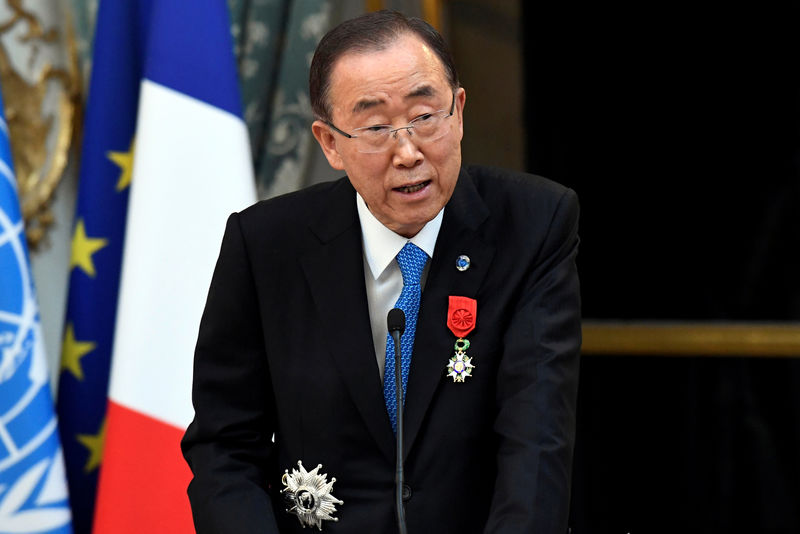By Jack Kim and Ju-min Park
SEOUL (Reuters) - Besides South Korean President Park Geun-hye, the biggest casualty of the country's mushrooming political corruption scandal may be the presidential aspirations of United Nations Secretary-General Ban Ki-moon.
Although he has not declared his candidacy, Ban was until a month ago the front-runner in opinion polls to win the election scheduled for Dec. 20, 2017, a race he was widely expected to contest from Park's conservative Saenuri Party.
But the scandal that has become known as "Park Geun-hye-Gate" and threatens Park's presidency has sowed division in the party. An impeachment vote is set for later this week, and Ban's standing in polls has declined, while the Saenuri has become a much less viable platform for a run.
"It doesn't make any sense at all now for Secretary-General Ban Ki-moon to join the Saenuri Party. Unless he is stupid, he would never join Saenuri, would he?," said Choung Byoung-gug, a Saenuri lawmaker who co-heads an anti-Park faction that favours formation of a new conservative party.
It is not unusual for a major South Korean political party to break into factions, with the mainstream forming a new party.
"If a new sound conservative party is set up, then it may be a different situation, but at this point it is too early to say," said Choung.
Ban, 72, was South Korean foreign minister from 2004-2006 under the liberal President Roh Moo-hyun, but was a non-partisan career diplomat.
He now faces the prospect of having no party to join to make use of the political machinery crucial to running a campaign. That institutional support is especially important given that Ban has been based in New York for a decade and has never run for office in South Korea.
Time is also not on Ban's side if Park is forced to exit sooner than later.
Last week, Park sought to head off calls for her immediate resignation or impeachment by asking parliament to come up with a plan and timetable for her to step down. The opposition dismissed the manoeuvre and has called for an impeachment vote for Dec. 9.
If parliament votes for impeachment, which is not a certainty given the two-thirds majority needed would require the support of roughly 30 members of Park's Saenuri party, the Constitutional Court would still need to uphold the motion, a process that could take months.
SHORT RACE
If Park leaves early, either by resigning or by being forced out by impeachment, a new election for a full five-year presidential term must be held in 60 days.
An early election would be disadvantageous for Ban, since he cannot begin a campaign before his U.N. term ends on Dec. 31. If he had planned to run, his earlier political calculations would have been based on nearly a full year to campaign.
Ban has been evasive about his plans after his U.N. tenure ends, but he told Reuters in October that he was conscious of "expectations from many people in Korea that I should make myself available for a better future of Korea."
Asked to comment on Ban's intentions given the political crisis at home, U.N. spokesman Farhan Haq said: "The Secretary-General has already said repeatedly that he will concentrate on his work as Secretary-General until the end of the year."
The main opposition Democratic Party already has a crowded field of potential candidates, headed by Moon Jae-in, who lost to Park in 2012 and now lead the latest Realmeter poll with 21 percent support, ahead of the second-placed Ban, who has 17 percent.
Lee Jae-myung, the mayor of Seongnam just south of Seoul and a member of the Democratic Party, is a dark horse rising in the polls, with 15 percent, putting him in third place.
Computer entrepreneur and reformist member of parliament Ahn Cheol-soo is likely to be the opposition People's Party's candidate. Ahn had also run in 2012 before dropping out early to form a coalition with Moon against Park.
With the pride Koreans take in him as "president of the world" and absence of a strong rival, Ban had consistently ranked at the top of polls until slipping early last month as the scandal surrounding Park deepened.
Ban has never been formally affiliated with Park or her Saenuri Party but was seen to have the backing of conservative constituencies that had been the bedrock of Park's support.
Kookmin University professor Hong Sung-gul said Ban may benefit from his outsider status given the country's political turmoil, which has drawn hundreds of thousands to weekly Saturday night rallies calling for Park's removal.
"We're likely to see a strong manifestation of the messiah complex at this election," he said, referring to candidates presenting themselves as the answer to South Korea's political woes.

"Ban will have to show that he is that person."